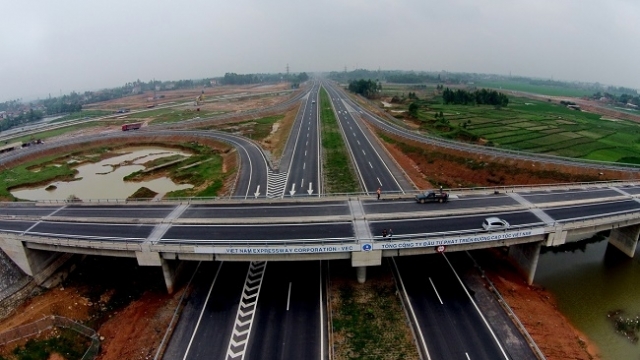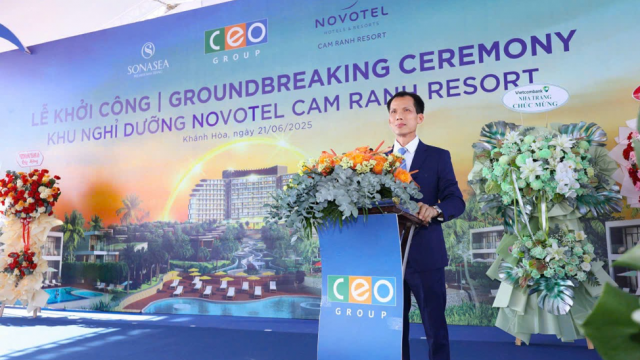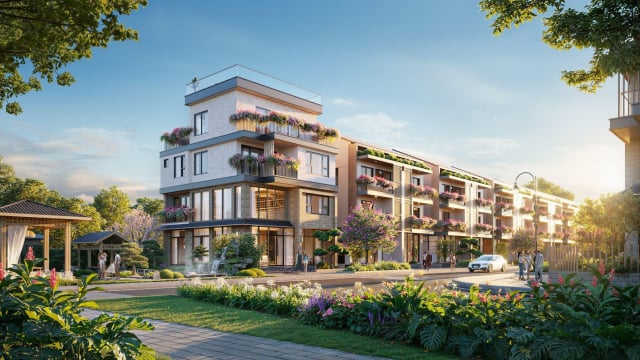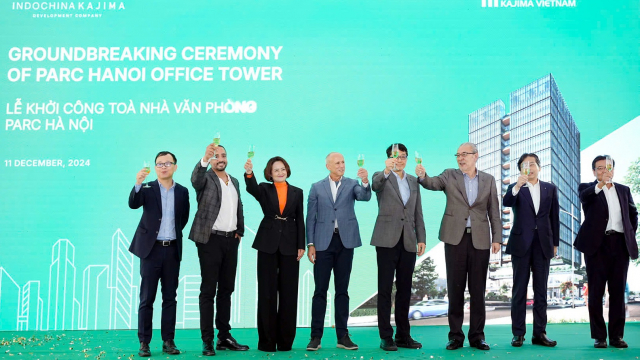Property
Hanoi and Ho Chi Minh City real estate markets experienced opposite trends
This is due to the difference in the investment purposes between Hanoi and Ho Chi Minh City, according to Do Thu Hang, associate director of Research and Consulting at Savills Vietnam.

Hanoi market is quiet while Ho Chi Minh City is vibrant
The recent reports on real estate market of companies show that both supply and liquidity of residential segment in Hanoi reduced slightly in the first quarter of this year. Whereas, The real estate market in Ho Chi Minh City witnessed positive development.
According to statistics from Savills, in the first quarter of this year, 11 new projects and next phases of 14 active projects launched 5,530 units, down 21 per cent compared to the previous quarter (QoQ) and down 40 per cent compared to the first quarter of last year (YoY).
Sales were down 15 per cent QoQ and 11 per cent YoY. Absorption rate declined three ppts both QoQ and YoY to 24 percent. Average asking price was $1,250 per square meter, stable QoQ but down eight per cent YoY.
Similarly, the villa and townhouse market experienced a decrease in supply after two years launching with continuously increasing prices.
According to a report from CBRE, the first quarter of 2018 recorded 450 newly-launched units in Hanoi. This is the smallest number of new launches of the first quarter in the past two years.
In terms of sales, more than 580 units from projects were recorded to be sold during the first quarter of the year, which was the lowest quarterly figure in the past nine years, with a decrease of 54 per cent QoQ and 64 per cent YoY.
Regarding pricing, in comparison with the previous quarter, the first quarter experienced a 5.4 per cent increase in the primary market while a decrease of five per cent in the secondary market, reaching $3,640 per square meter. Most of the urban districts report decreases in prices compared to the previous quarter, especially in older projects.
On the contrary, activity in the condominium market was at a high level in the first quarter of 2018 despite long Tet holiday. The level of newly launched supply increased sharply when compared with the same period of last year. Strong sales momentum was maintained, especially in new projects.
According to CBRE, in the first three months of this year, the market welcomed 9,503 new units, an increase of 11 per cent QoQ and 79 per cent YoY. Developers launched products in the review quarter after delays due to an extended review of the market during 2017.
Sales performance was positive in the first quarter with 9,260 sold units, an improvement of four per cent QoQ and 26 per cent YoY. High sold rates from 90 per cent to 100 per cent were observed at projects from reputable developers with reasonable prices.
The average selling price from developers in the first quarter of this year was recorded at $1,515 per square meter, representing a decrease of 1.5 per cent QoQ and 2.6 per cent YoY.
Difference in investment purpose
Explaining the difference in the real estate market between Hanoi and Ho Chi Minh City, associate director of Research and Consulting at Savills Vietnam Do Thu Hang said that is because of the difference in the purchasing purposes. Specifically, people in Hanoi mostly buy houses to live while those in Ho Chi Minh City buy houses for rent.

The rental market in Ho Chi Minh City has brought high profit for investors. Therefore, when this segment is still developing, customers would continue pouring money into apartments to lease.
Whereas, customers in Hanoi usually spend money on buying apartments to live or hoard properties instead of short-term leasing.
Besides, the housing rental in Hanoi is not as high as in Ho Chi Minh City. Moreover, the current inventory in the real estate market is still large due to the huge number of newly launched projects in the previous period.
Nguyen Hoai An, director of Research and Consulting Services at CBRE Vietnam, said that the market in Hanoi was quiet mostly due to low demand of people after Tet holiday.
However, the positive sentiment from 2017 continued on the market in the first quarter of this year. Despite recording a slight decrease, the new supply in the market still exceeded the average amount of supply in the first quarter of the previous years.
Remarkably, the mid-end segment continued to expand, accounting for about three-quarters of newly launched projects.
In the remaining quarters of this year, An forecasts that the fire in Carina Plaza would affect people’s decision in buying houses. The price of apartments in some low-quality projects that do not meet fire safety standards may be slightly reduced.
However, this reduction would just be seen in some projects but the common trend of the market as the condominium is still an attractive segment.
An said that buyers should be careful when choosing projects, especially paying attention to technical problems and fire safety. Also, investors need to improve the quality of projects to attract customers and find liquidity, especially in the context of current strong apartments supply.
Vietnam real estate market ranked in top three markets in attracting investment in South East Asia
Hai Phong industrial property powers up with new project from Indochina Kajima
The project Core5 Hai Phong from Indochina Kajima and Itochu Corporation will deliver approximately 80,000 square metres of world-class ready-built factory for lease, handover expected in the first quarter of 2027.
A decade of unprecedented apartment price surge
A decade of relentless apartment price growth has pushed the dream of homeownership further out of reach for Vietnam’s middle- and lower-income earners.
Essensia Parkway sells out within hours, marking an outstanding partnership with WorldHotels
Essensia Parkway makes significant impact in the high-end real estate market as 100 per cent of the limited collection was successfully registered within just a few hours at the launching event with the theme “Live lux-well, in a truly refined world”.
Essensia Parkway gains global prestige through WorldHotels - Phu Long collaboration
Essensia Parkway is set to mark a significant milestone as the first branded residences project in Ho Chi Minh City to be operated by WorldHotels – one of the finest portfolios of independent hotels and resorts within BWH Hotels.
Indochina Kajima breaks ground on Grade A office building in Hanoi’s emerging hub
Parc Hanoi marks Indochina Kajima's first office-for-lease project in its $1 billion investment plan in Vietnam.









































